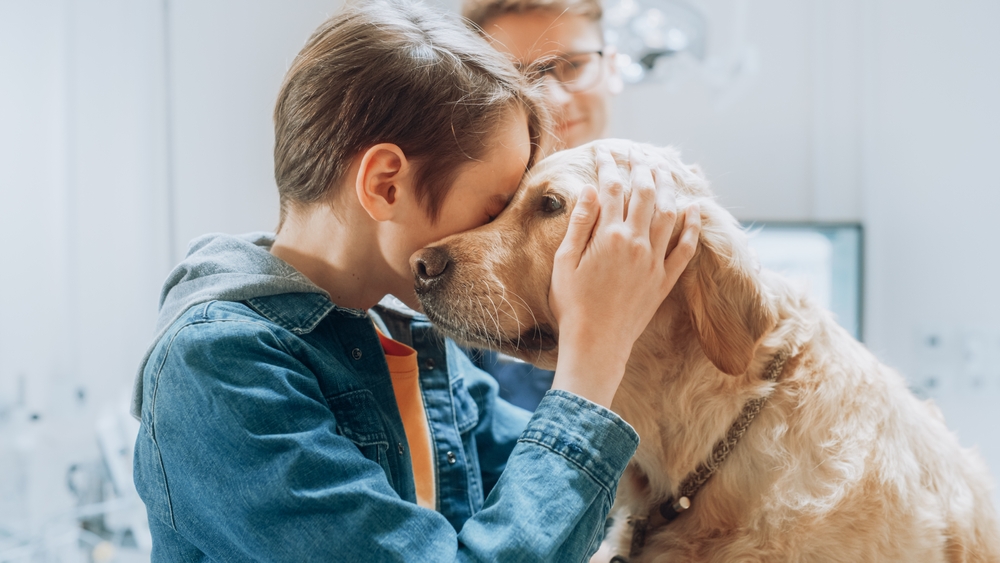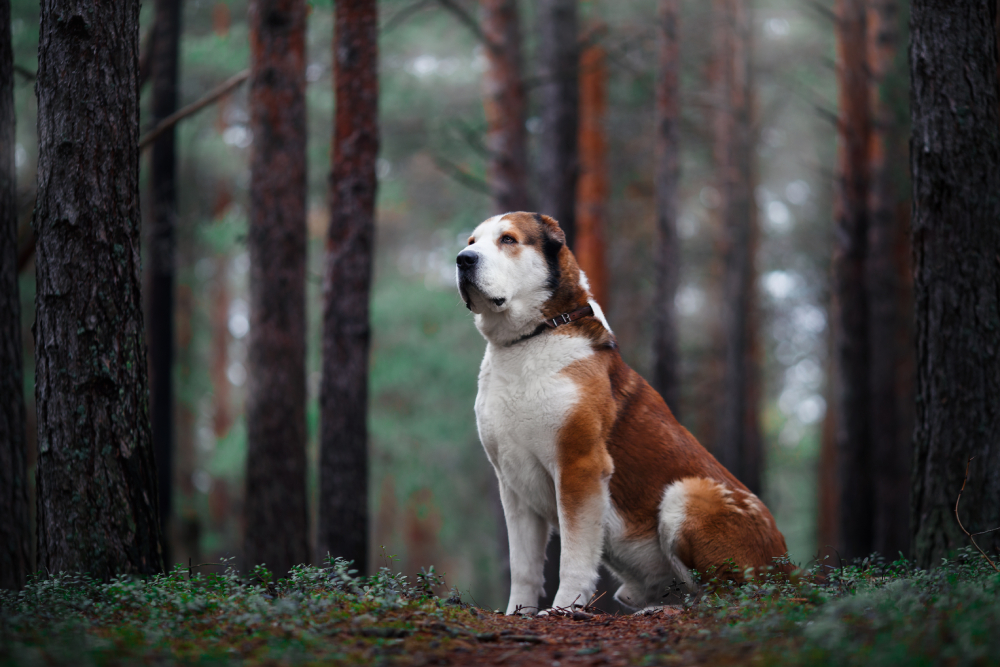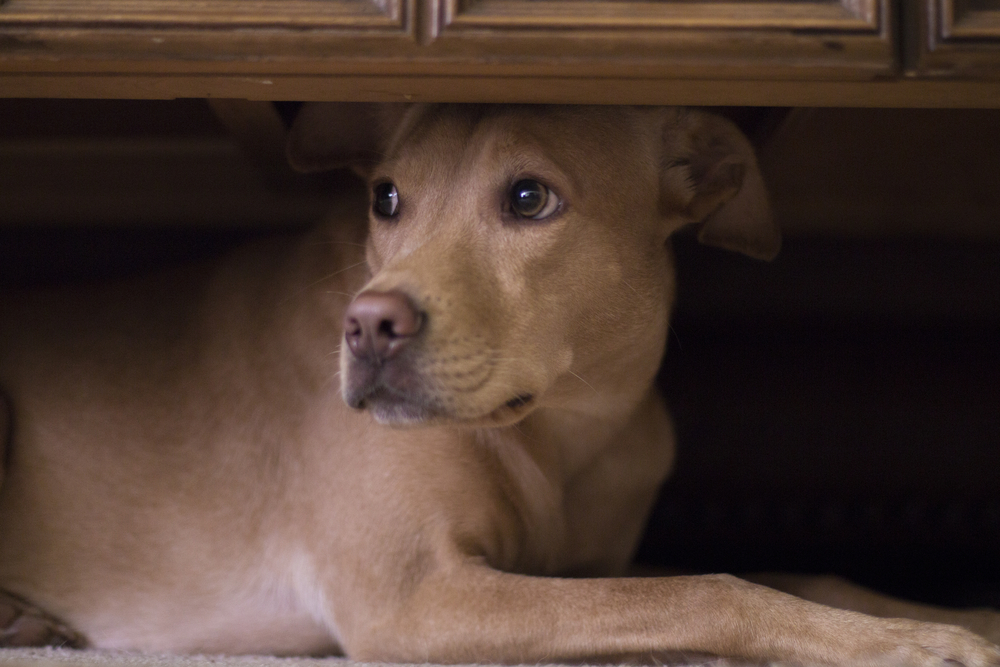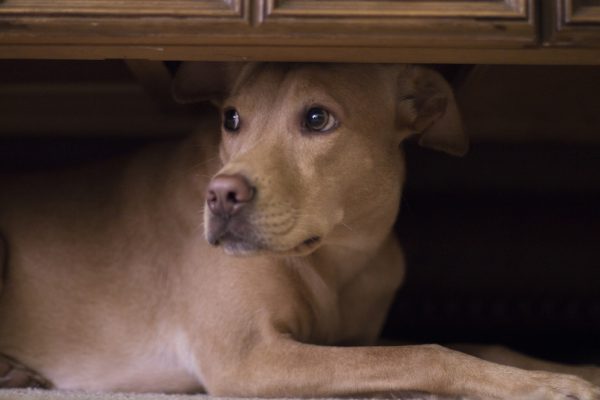Click to Skip Ahead
The world is pretty evenly split when it comes to believing in the paranormal, with 45% of people believing in ghosts and paranormal entities.1 You can also find countless stories online about people’s dogs having the ability to sense spirits and even see them.
Whether or not you believe in ghosts, dogs will often bark or react to things that we can’t see or sense. This is because they navigate the world differently from humans and have powerful senses. So, it’s possible for them to detect things that humans can’t. While we can’t prove the existence of ghosts and whether dogs can see them, we can go over some possible reasons why dogs will react or be provoked by what seems like nothing.

Both dogs and humans share the same five senses: sight, smell, taste, hearing, and touch. However, our set of senses works very differently from a dog’s senses, and dogs have several advantages over humans.
1. Smell
First, dogs have powerful noses and navigate the world through scents. Their sense of smell is between 1,000 to 10,000 times better than humans. Dogs also have over 100 million sensory receptor sites in their nasal cavity, while humans have 6 million. The area in their brain that analyzes odors is also about 40 times larger than a human’s.
Dogs can smell biological chemicals, and some can be trained to detect cancer, infectious disease, and diabetes. A recent test saw that dogs can detect COVID-19 with a 94% accuracy rate.2
So, it’s safe to say that dogs can detect scents that are untraceable to the human nose. It’s very common for dogs to suddenly stop what they’re doing and become very still and alert when they smell a strange or intriguing scent. We can’t say for sure that your dog has sniffed out a ghost, but it’s very possible that they’ve smelled a shift in your environment that has piqued their interest.

2. Hearing
Dogs also have incredible hearing. They’re able to hear pitches that are too high for humans to hear. While the average human adult can hear pitches up to 23,000 Hz, dogs can hear sounds between 67- 45,000 Hz. They’re also much more sensitive and attuned to small changes in pitch.
Dogs outperform humans when it comes to detecting softer sounds. The human’s auditory threshold is at 0 dB. Dogs can hear below this threshold and can detect sounds as quiet as around -5 dB.
We often live in blissful ignorance about a ton of sounds that we can’t hear but our dogs can hear clearly. Your dog will be able to hear certain noises in your home that you aren’t aware of. They might hear animals scurrying outside your house or changes in pitch from household appliances. So, it can seem like your dog is suddenly reacting to nothing, but it may be because their powerful ears detected an unfamiliar sound or a shift in pitches.

3. Night Vision
Many people think that humans have a visual advantage over dogs because humans can see a wider range of colors. However, dogs have much better night vision than humans. Dogs have more rods in their eyes, which are responsible for detecting dim light. Most dog breeds also have an eye layer called the tapetum lucidum. This layer reflects any light that reaches the rods in a dog’s eyes, which enables them to see better in low-light settings.
A lot of paranormal activity is thought to happen at night. It’s possible that dogs may react and start barking in the dark because they can physically see objects that humans wouldn’t be able to.
Do Dogs Have a Sixth Sense?
There’s no denying that dogs are very observant animals. They’re very perceptive and quick to notice any changes in their environment, and it can seem like they have a sixth sense for detecting paranormal activity. However, it’s important to remember that it’s the culmination of their powerful senses, and probably not a sixth sense, that helps them notice things that humans can’t.
Dogs tend to be much more present and in the moment than humans, so they’re very aware and attuned to what their senses are picking up. They’re paying attention to smells and sounds and using other parts of their body to have a good read on their environment.
Dogs have also evolved to be quite intuitive animals. Their ability to detect human emotions and respond accordingly has helped with their survival and success in becoming constant companions to humans. They pick up on a surprising amount of details, and your dog often knows you much better than you think. Dogs can smell fear in humans when their noses pick up chemical changes in the body that are associated with fear, and they change their behavior accordingly.
All to say, your dog is very perceptive and sensitive to things we’re often unaware of. So, it’s always worth paying attention to your dog when they’re barking and figuring out what’s got their attention. It may not be a sixth sense, but your dog could have picked up on something they think worth your attention.

Other Reasons Dogs Bark at “Nothing”
Sometimes, it’s easy to find what’s causing your dog to bark. There might be an animal outside, or a household appliance is making a strange noise. However, there are times when your dog’s behavior changes, and it’s not due to any detectable external factors.
It’s important not to brush off any sudden changes in behavior from your dog because they might indicate an underlying medical issue. For example, dogs can act more clingy or restless when they’re not feeling well. They can become more irritable or agitated. Behavioral changes can also indicate chronic behavioral issues like compulsive disorders and separation anxiety. Canine cognitive decline can also lead to excessive barking out of context.
If you notice any behavioral changes in your dog, it’s best to take them to the veterinarian for a checkup. Your veterinarian can take a history, do a physical exam on your dog, and run any diagnostic tests to see if the behavioral changes are caused by a medical issue.

Dogs and Ghosts in Folklore
It’s fun to learn about dogs in folklore, and these legends have perpetuated the belief that dogs can see ghosts. Myths like ghost hounds and hellhounds associate dogs with paranormal activities, along with dog-like cryptids such as the Adjule and Lougarou.
Different ancient civilizations also held the belief that dogs could see spirits. For example, in ancient Aztec and Mayan culture, it was believed that Xoloitzcuintlis could sense someone’s spirit departing from their bodies and would guide spirits in their journey to the Underworld. Many other cultures around the world believed that dogs could see spirits and protect people from them. It was common in these communities to see dogs living with families with the partial purpose of protecting them from evil spirits.
 Conclusion
Conclusion
Dogs have often been perceived as animals that are aware of ghosts and paranormal activity. Their connection to old folklore perpetuates this belief, along with their natural ability to detect and observe things that humans can’t.
Whether you believe that your dog can see ghosts or not, it’s still worth paying attention when your dog starts reacting to something you can’t see or hear. It’s possible that they’ve picked up on something that does require your attention, and it doesn’t hurt to try to figure out what it is. Lastly, if you notice any sudden behavioral changes in your dog, contact your veterinarian to determine if a health issue is the cause of these changes.
Featured Image Credit: Patrick H, Shutterstock









